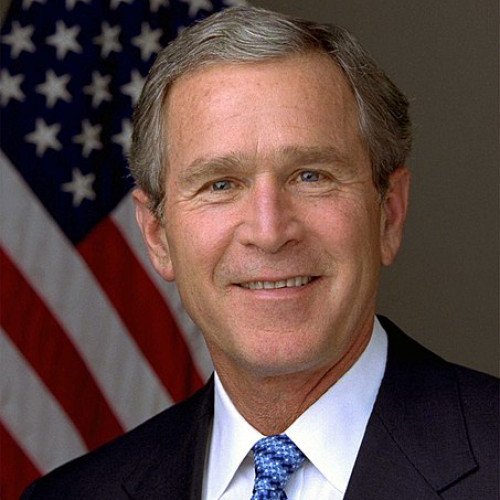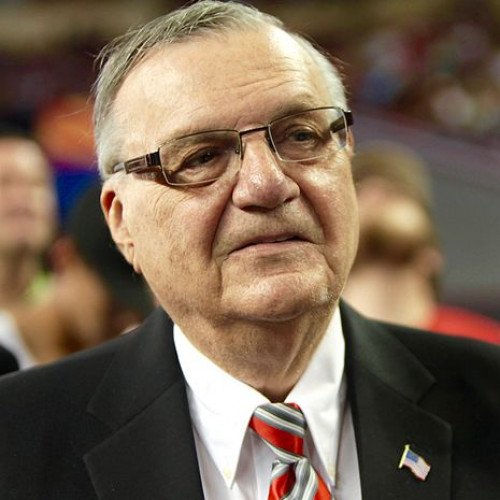George W. Bush VS Joe Arpaio

George W. Bush
George Walker Bush (born July 6, 1946) is an American politician and businessman who served as the 43rd president of the United States from 2001 to 2009. A member of the Republican Party, he had previously served as the 46th governor of Texas from 1995 to 2000. Born into the Bush family, his father, George H. W. Bush, served as the 41st president of the United States from 1989 to 1993. Bush is the eldest son of Barbara and George H. W. Bush. As such he is the second son of a former United States president to himself become the American president, with the first being John Quincy Adams, the son of John Adams. He flew warplanes in the Texas and Alabama Air National Guard. After graduating from Yale College in 1968 and Harvard Business School in 1975, he worked in the oil industry. Bush married Laura Welch in 1977 and unsuccessfully ran for the U.S. House of Representatives shortly thereafter. He later co-owned the Texas Rangers baseball team before defeating incumbent Ann Richards in the 1994 Texas gubernatorial election. As governor, Bush successfully sponsored legislation for tort reform, increased education funding, set higher standards for schools, and reformed the criminal justice system. Bush also helped make Texas the leading producer of wind powered electricity in the U.S. Bush was elected president in 2000 when he defeated Democratic incumbent Vice President Al Gore after a narrow and contested win that involved a Supreme Court decision to stop a recount in Florida. He became the fourth person to be elected president without a popular vote victory. Upon taking office, Bush pushed through a $1.3 trillion tax cut program and the No Child Left Behind Act, a major education reform bill. He also pushed for socially conservative efforts, such as the Partial-Birth Abortion Ban Act and faith-based welfare initiatives. In response to the September 11 terrorist attacks, Bush created the Department of Homeland Security and launched a "War on Terror" that began with the war in Afghanistan in 2001. He also signed into law the controversial Patriot Act in order to authorize surveillance of suspected terrorists. In 2003, Bush ordered an invasion of Iraq, beginning the Iraq War, with the administration arguing that the Saddam Hussein regime possessed an active weapons of mass destruction (WMD) program, and that the Iraqi government posed a threat to the U.S. Some administration officials falsely claimed that Hussein had an operational relationship with Al-Qaeda, the perpetrators of the 9/11 attack. No stockpiles of WMDs or an active WMD program were ever found in Iraq. Bush also signed into law the Medicare Modernization Act, which created Medicare Part D, and funding for the AIDS relief program known as PEPFAR. Bush was re-elected to a second term in the 2004 presidential election, defeating Democratic Senator John Kerry in a close race. During his second term, Bush reached multiple free trade agreements and successfully nominated John Roberts and Samuel Alito to the Supreme Court. He sought major changes to Social Security and immigration laws, but both efforts failed. The wars in Afghanistan and Iraq continued, and in 2007 he launched a surge of troops in Iraq. Bush received criticism from across the political spectrum for his handling of Hurricane Katrina, and the midterm dismissal of U.S. attorneys. Amid this criticism, the Democratic Party regained control of Congress in the 2006 elections. In December 2007, the U.S. entered the Great Recession, prompting the Bush administration to obtain congressional approval for multiple economic programs intended to preserve the country's financial system, including the Troubled Asset Relief Program (TARP) to buy toxic assets from financial institutions. Bush was among the most popular, as well as unpopular, U.S. presidents in history; he received the highest recorded approval ratings in the wake of the 9/11 attacks, but one of the lowest such ratings during the 2008 financial crisis. Bush finished his second term in office in 2009 and returned to Texas. In 2010, he published his memoir, Decision Points. His presidential library opened in 2013. His presidency has been rated as below-average in historical rankings of U.S. presidents, although his public favorability ratings have improved since leaving office.
Statistics for this Xoptio

Joe Arpaio
Joseph Michael Arpaio (; born June 14, 1932) is an American former law enforcement officer and politician. He served as the 36th Sheriff of Maricopa County, Arizona for 24 years, from 1993 to 2017, losing reelection to Democrat Paul Penzone in 2016. Starting in 2005, Arpaio took an outspoken stance against illegal immigration, styling himself as "America's Toughest Sheriff". In 2010, he became a flashpoint for opposition to Arizona's SB1070 anti-illegal immigrant law, which was largely struck down by the Supreme Court of the United States. Arpaio is also known for investigating former U.S. President Barack Obama's birth certificate, and, as of 2018, he continued to claim without evidence that it was forged.Arpaio has been accused of numerous types of police misconduct, including abuse of power, misuse of funds, failure to investigate sex crimes, criminal negligence, abuse of suspects in custody, improper clearance of cases, unlawful enforcement of immigration laws, and election law violations. A Federal court monitor was appointed to oversee his office's operations because of complaints of racial profiling. The U.S. Department of Justice concluded that Arpaio oversaw the worst pattern of racial profiling in U.S. history, and subsequently filed suit against him for unlawful discriminatory police conduct. Arpaio and the MCSO were named as defendants in dozens of civil lawsuits brought by citizens arrested by Arpaio and his deputies alleging wrongful arrest, wrongful death, entrapment and other claims, costing taxpayers in Maricopa County over $140 million in litigation against Arpaio during his tenure as sheriff.Over the course of his career, Arpaio was the subject of several federal civil rights lawsuits. In one case, he was a defendant in a decade-long suit in which a federal court issued an injunction barring him from conducting further "immigration round-ups". A federal court subsequently found that after the order was issued, Arpaio's office continued to detain "persons for further investigation without reasonable suspicion that a crime has been or is being committed." In July 2017, he was convicted of criminal contempt of court, a crime for which he was pardoned by President Donald Trump on August 25, 2017. In a separate racial-profiling case which concluded in 2013, Arpaio and his subordinates were found to have unfairly targeted Hispanics in conducting traffic stops.Although Arpaio sought another term as Maricopa County Sheriff in 2016, the contempt of court conviction eroded much of his remaining political support, and he was defeated in the election by Paul Penzone, a Democrat who reversed many of Arpaio's policies after taking office. Arpaio was an unsuccessful candidate in Arizona's Republican primary election for U.S. Senate in 2018. On August 25, 2019, Arpaio issued a statement saying that he would run for sheriff of Maricopa County in 2020. He lost the August 2020 primary election.